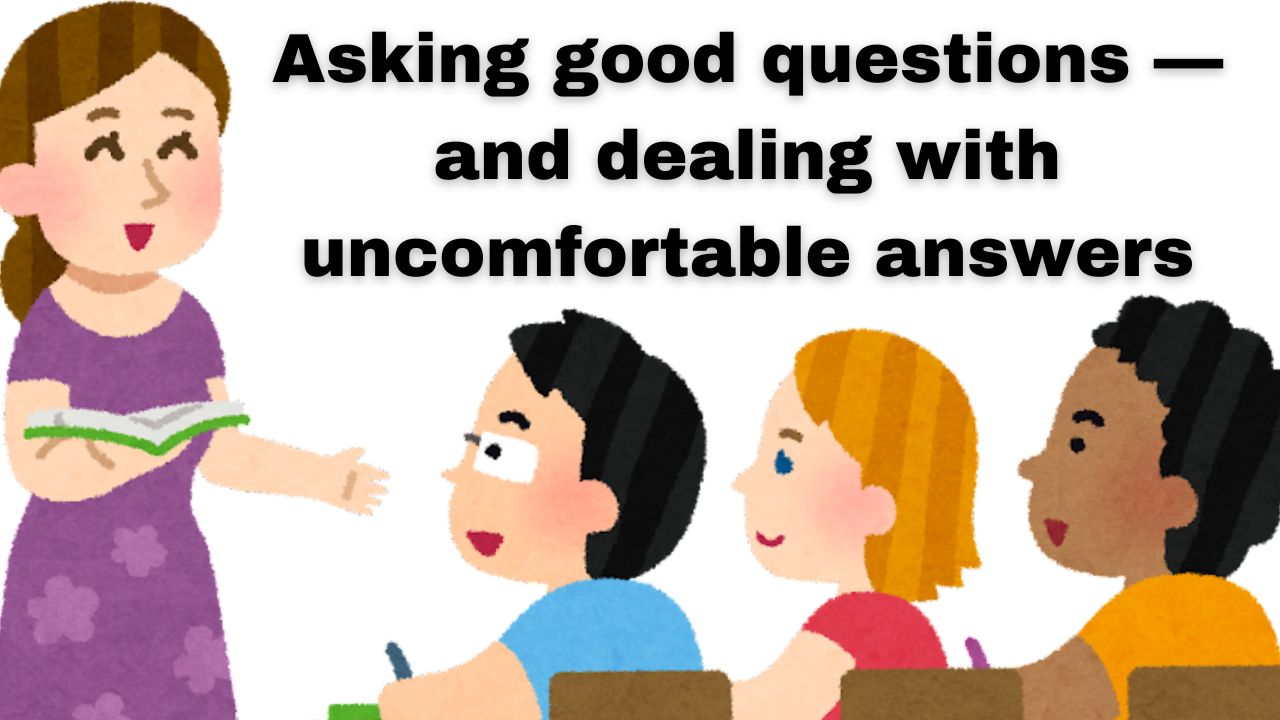
Asking good questions — and dealing with uncomfortable answers
[For an audio/vlog version of this story, click here.]
‘Rather than ask my child, «What did you learn at school today?», I believe it’s better to ask, «Did you ask good questions?»‘
That suggestion was given by a contributor to a BBC podcast series presented by Rory Stewart, titled The long history of ignorance, released last year.
Need-to-know basis
The idea is that not only is it better to be an active, engaged learner rather than a passive one but also how we go about such engagement makes a telling difference. We should try to become more effective at probing to get the information that will help us understand an issue — or a person — more clearly. (Whilst being aware that for certain issues we may never discover the truth.)
What constitutes good questions will depend on the subject, the context and the inquisitor’s level of knowledge. OK, asking open questions — the five Ws (who, what, when, where, why) and H (how) — rather than closed questions is a decent overall rule. In fairness to many young children, they do this naturally, something I touched on in The just-how-it-is society, before said society starts to inhibit their inquisitiveness, that is.
‘What my reply didn’t specify — because I wasn’t asked — was if my thinking about her was positive or negative. Or worse, indifferent, with indifference the essence of inhumanity, as George Bernard Shaw put it in The Devil’s Disciple.’
The obvious problem with closed questions is that by their design they don’t call for deep responses. If the questioner gets the answer he/she expected or wanted to hear, there may not be a follow-up, while the person questioned may be content not to divulge more without being pushed to do so.
For example, a woman in San José del Guaviare with whom I’d been intimately involved asked me in a message if I think about her. I replied in the affirmative. I wasn’t lying. I did and do think about her. Somebody who only recently entered my life and still communicates with me from a distance, well it’s highly likely I am going to think about her. It’s hard not to.
What my reply didn’t specify — because I wasn’t asked — was if my thinking about her was positive or negative. Or worse, indifferent, with indifference being the essence of inhumanity, as George Bernard Shaw put it in The Devil’s Disciple.
She could have followed up her initial question with, ‘How do you feel when you think about me?’, or something similar. That would have required me to give a more detailed answer. Or at least a diplomatic one. Yes, a more truthful answer is almost always best but at times it can be hard for us to be fully honest.
Learning to deal with it
In general, the person questioned may not, as for me in the example described above, want to say much — or simply may not be able to say much because he/she doesn’t have the answers — but at least with the right line of questioning one can get a clearer idea of the situation. All this is better carried out in a face-to-face scenario where body language will most likely tell us more than words alone. It’s quite easy to bluff or lie in a message, be it by text or voice.
Yet, even if we ask good questions that lead to our getting accurate answers, we don’t always take the necessary lessons they impart. To do so is often the more challenging part.
Returning to soppy emotional affairs, another San José del Guaviare woman, one whose company and conduct I had enjoyed, told me bluntly in a WhatsApp message that she didn’t want to see me again. She gave no specific reason(s) for this. Now, experience has taught me that there’s no coming back from that. Yet, my acceptance of this fact has been quite difficult — well, had been quite difficult. I’m moving on. Honestly, I am.
Asinine romantic escapades aside, asking good questions is one step towards becoming a more clued-in, well-rounded individual. Having the wherewithal to deal with and, if possible, act on any uncomfortable, perplexing or even unfathomable answers arising from those good questions can propel one towards greatness. Some of us, however, are unwilling — or unable — to put in the effort required.
__________________________________________________________
Listen to The Corrigan Cast podcast here.
Facebook: Wrong Way Corrigan — The Blog & IQuiz «The Bogotá Pub Quiz».





Comentarios